The Impact of AI on Customer Experience Evolution
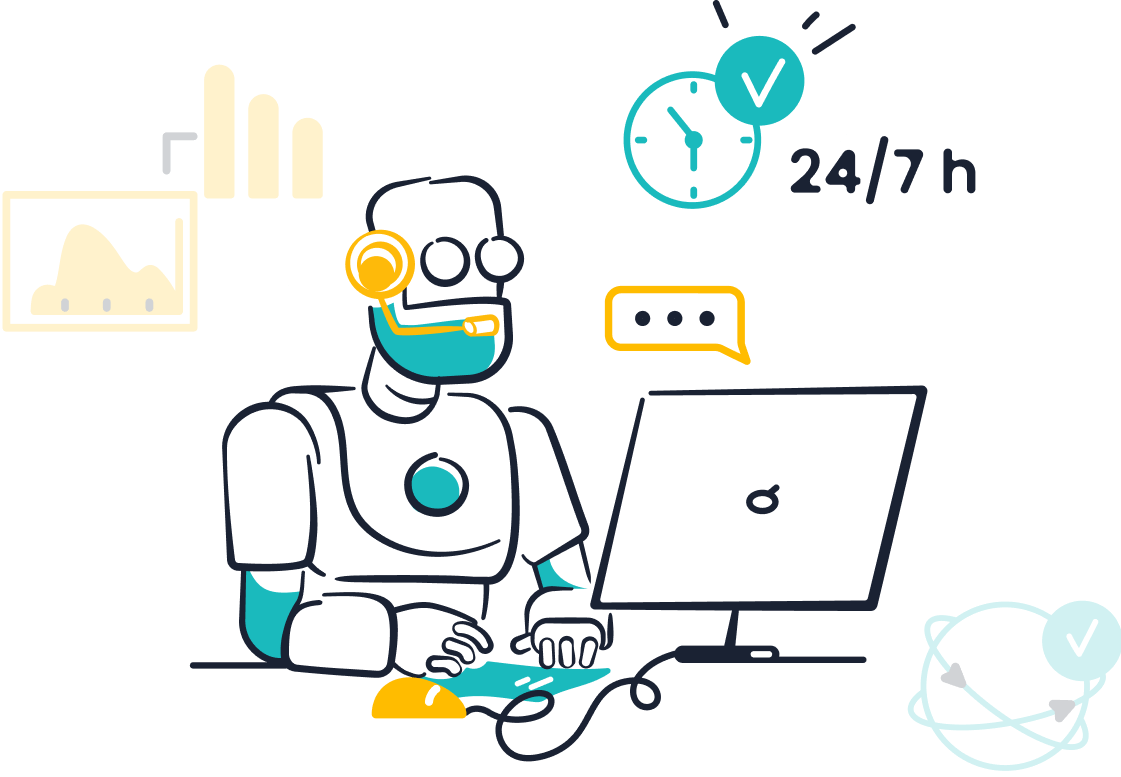
AI is reshaping the way you interact with businesses, driving a remarkable transformation in customer experience trends. With its ability to deliver personalized user experiences and automate routine processes, AI ensures faster responses and smarter solutions. For example, AI chatbots now handle up to 80% of customer inquiries, freeing human agents to focus on complex issues. By 2025, AI will manage 95% of all customer interactions, making it central to customer experience transformation. Companies like Sobot leverage AI-powered personalization to meet consumer expectations, enhance loyalty, and redefine the future of consumer engagement.
The Evolution of AI in Customer Experience

From Basic Automation to AI-Driven Insights
AI has come a long way from its early days of basic automation. Initially, businesses used automation to handle repetitive tasks like sending confirmation emails or routing customer inquiries. While this improved efficiency, it lacked the ability to truly understand or anticipate customer needs. Today, AI has evolved into a powerful tool that delivers actionable insights, transforming customer experience trends.
AI now analyzes customer conversations to uncover patterns and identify areas for improvement. For example, it can detect recurring issues in support tickets, helping businesses address root causes. Predictive analytics further enhances this process by forecasting customer needs. This allows you to proactively solve problems before they arise, boosting satisfaction and loyalty. Companies like Sobot leverage AI-driven personalization to refine their strategies, ensuring every interaction feels tailored and meaningful.
The shift from basic automation to AI-driven insights has also enabled smarter decision-making. AI tools evaluate customer behavior and feedback, providing businesses with data-backed recommendations. This transformation has turned customer service from a reactive function into a strategic advantage.
Rise of Hyper-Personalization in Customer Interactions
Hyper-personalization has redefined how businesses engage with customers. Unlike traditional methods, which rely on broad demographic data, hyper-personalization uses AI to analyze individual preferences, behaviors, and real-time interactions. This approach ensures that every customer receives a personalized experience tailored to their unique needs.
For instance, 80% of consumers are more likely to purchase from brands offering personalized experiences. Companies using advanced personalization techniques report 20% higher conversion rates compared to traditional methods. Brands like Sephora and Nike have successfully implemented hyper-personalization, demonstrating its ability to drive consumer engagement and loyalty.
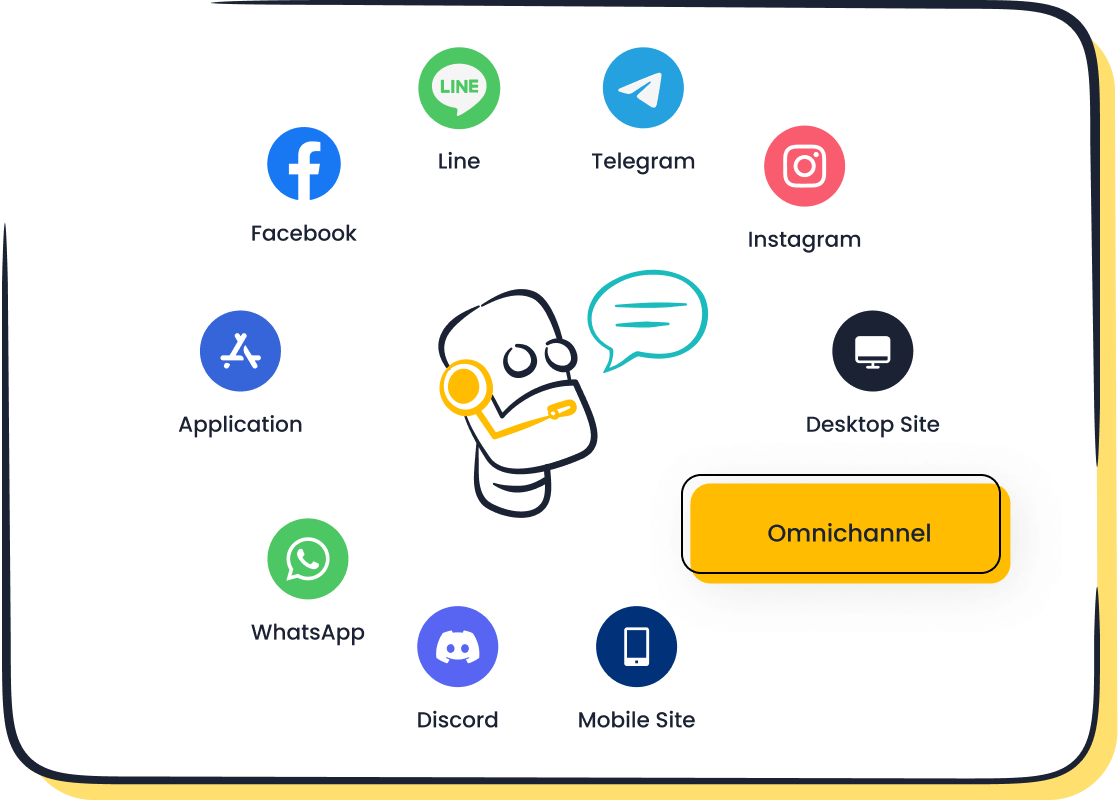
Sobot’s AI solutions excel in delivering hyper-personalized customer experiences. The Sobot AI Chatbot, for example, uses real-time personalization to provide instant, accurate responses across multiple channels. Its multilingual capabilities and 24/7 availability ensure seamless interactions, no matter where or when customers reach out. By integrating AI into your customer service strategy, you can enhance engagement, reduce costs, and build lasting relationships.
Autonomous AI and Predictive Decision-Making
Autonomous AI takes customer experience to the next level by combining automation with predictive decision-making. This technology enables AI systems to operate independently, analyzing data and making decisions without human intervention. The result is faster, more efficient service that meets customer expectations.
Retailers like Amazon use AI to predict buying patterns, achieving a 50% increase in inventory accuracy. Similarly, Netflix analyzes user behavior in real-time to recommend content, enhancing user engagement. Sobot’s AI solutions bring these capabilities to businesses of all sizes. For example, its AI-powered tools can dynamically adjust marketing campaigns based on customer behavior, ensuring maximum impact.
Predictive decision-making also improves operational efficiency. AI can optimize delivery routes by analyzing traffic and weather conditions or suggest staffing levels in healthcare settings based on patient inflow patterns. These applications demonstrate how AI not only enhances customer interactions but also drives business success.
By adopting autonomous AI, you can stay ahead of customer experience trends and deliver unparalleled service. Whether it’s through real-time personalization or predictive analytics, AI empowers you to meet and exceed customer expectations.
Key Applications of AI in Customer Experience
Intelligent Customer Service with Sobot Chatbot

AI has transformed customer service into a more efficient and intelligent process. With tools like the Sobot AI Chatbot, you can automate routine inquiries and provide instant responses across multiple channels. This chatbot operates 24/7, ensuring customers receive support whenever they need it. Its multilingual capabilities allow you to engage with a global audience, while its no-code setup makes it easy to deploy.
The Sobot AI Chatbot doesn’t just answer questions; it enhances productivity by assisting human agents with complex tasks. For example, it can triage queries, saving up to 50% on operational costs. It also boosts conversions by 20% through proactive messaging and real-time intent assistance. These features make it an essential tool for intelligent customer service, helping you deliver personalized experiences that build loyalty.
Statistics show that 90% of customers expect instant responses when reaching out for support. AI-powered chatbots meet this demand, with 68% of users appreciating their speed and efficiency. By integrating Sobot’s chatbot into your customer service strategy, you can align with these customer experience trends and exceed expectations.
Hyper-Personalized Recommendations for Enhanced Engagement
Personalized recommendations have become a cornerstone of modern customer experience. AI analyzes individual preferences, behaviors, and purchase histories to deliver tailored suggestions. This approach not only enhances engagement but also drives revenue growth. For instance, businesses using AI-powered personalization report a 20% increase in conversion rates.
Sobot’s AI solutions excel in this area. By leveraging advanced algorithms, you can offer hyper-personalized recommendations that resonate with your customers. Whether it’s suggesting products based on browsing history or tailoring marketing campaigns to individual needs, AI ensures every interaction feels meaningful. This level of personalization boosts customer satisfaction and increases lifetime value.
Metrics like engagement rate, conversion rate, and Net Promoter Score (NPS) validate the impact of personalized recommendations. For example, higher NPS scores indicate that customers are more likely to recommend your brand to others. By adopting AI-driven personalization, you can create experiences that not only meet but exceed customer expectations.
Omnichannel Orchestration for Seamless Customer Journeys
AI plays a pivotal role in orchestrating seamless customer journeys across multiple channels. With omnichannel experience orchestration, you can unify interactions on platforms like chat, email, voice, and social media. This ensures customers enjoy consistent and connected experiences, regardless of how they choose to engage.
Sobot’s AI solutions simplify this process. By integrating communication channels into a single platform, you can manage interactions more efficiently. For example, Sobot’s tools enable you to track customer journeys, identify pain points, and optimize touchpoints for better outcomes. Metrics like Customer Satisfaction Score (CSAT) and Customer Effort Score (CES) highlight the success of these efforts.
A well-orchestrated journey reduces friction and enhances satisfaction. Studies show that customers who experience seamless interactions are more likely to remain loyal and recommend your brand. By leveraging AI for omnichannel orchestration, you can create journeys that not only delight customers but also drive business success.
Real-Time Personalization in Customer Interactions
Real-time personalization has become a game-changer in enhancing customer experience. It allows businesses to tailor interactions based on live data, ensuring every customer feels valued and understood. This approach goes beyond static personalization by adapting to customer behavior as it happens, creating a dynamic and engaging experience.
Why Real-Time Personalization Matters
Real-time personalization improves customer engagement by delivering relevant content at the right moment. For example:
- Retail websites can showcase products based on your location, making suggestions that feel timely and useful.
- Weather apps might recommend clothing options suited to current weather conditions, adding value to your experience.
These personalized touches not only make interactions more meaningful but also drive business outcomes. Timely and relevant offers encourage purchases, increasing revenue for businesses.
| Benefit | Description |
|---|---|
| Enhanced User Experiences | Real-time personalization improves user experiences by tailoring content to individual preferences. |
| Improved Engagement | Customers are more likely to interact with brands that understand their needs and preferences. |
| Increased Revenue | Personalized offers can lead to higher conversion rates and average order values. |
How Sobot Enhances Real-Time Personalization
Sobot’s AI solutions excel in delivering real-time personalization. The Sobot AI Chatbot, for instance, uses advanced algorithms to analyze customer behavior instantly. It provides tailored responses across multiple channels, ensuring seamless and consistent interactions. Whether you’re browsing a website or chatting on WhatsApp, Sobot’s chatbot adapts to your needs in real time.
This capability doesn’t just improve customer satisfaction. It also boosts operational efficiency. By automating personalized interactions, Sobot helps businesses save time and resources while maintaining a high level of service. For example, the chatbot can proactively suggest products or services based on your browsing history, increasing the likelihood of a purchase.
The Impact of Real-Time Personalization
Real-time personalization transforms how you interact with brands. It creates a sense of connection, making you feel like more than just another customer. Studies show that customers are more likely to engage with brands that understand their preferences. This leads to higher satisfaction, loyalty, and even advocacy.
By integrating AI-powered tools like Sobot’s chatbot into your strategy, you can deliver experiences that resonate with your audience. Real-time personalization isn’t just a trend; it’s a necessity in today’s competitive landscape. It empowers you to meet customer expectations while driving growth and efficiency.
Tip: Start leveraging real-time personalization today to stay ahead in customer experience trends. Tools like Sobot’s AI Chatbot make it easy to implement and scale personalized interactions.
Benefits of AI in Customer Experience
Enhancing Customer Loyalty Through Personalized Experiences
AI has revolutionized how businesses build customer loyalty. By leveraging AI, you can deliver personalized experiences that resonate with individual preferences. This approach makes customers feel valued and understood, which strengthens their connection to your brand. For example, 80% of customers are more likely to do business with companies offering personalized experiences. Additionally, 62% of consumers are willing to spend more when their shopping journey feels customized.
Sobot’s AI solutions excel in creating these tailored interactions. The Sobot AI Chatbot uses advanced algorithms to analyze customer behavior and provide real-time recommendations. Whether it’s suggesting products based on browsing history or offering proactive support, AI ensures every interaction feels meaningful. This level of personalization not only enhances customer satisfaction but also fosters long-term loyalty.
Tip: Start using AI-powered tools like Sobot’s chatbot to create personalized experiences that drive customer retention and loyalty.
Driving Revenue Growth with AI-Powered Engagement
AI doesn’t just improve customer interactions; it also drives revenue growth. By analyzing customer data, AI identifies trends and opportunities that help you optimize your marketing strategies. Businesses using AI-powered personalization report a 20% increase in conversion rates. This demonstrates how AI can turn customer engagement into tangible financial results.
Sobot’s AI tools enable you to engage customers more effectively. For instance, the Sobot AI Chatbot proactively assists customers during their buying journey, increasing the likelihood of a purchase. It also provides insights into customer preferences, allowing you to tailor your campaigns for maximum impact. These capabilities make AI an essential tool for boosting both engagement and revenue.
Improving Operational Efficiency in Customer Support
AI significantly enhances operational efficiency in customer support. It automates repetitive tasks, allowing your team to focus on complex issues. Metrics like Average Call Time (ACT) and First-Time Resolution Rate (FTR) highlight how AI improves service efficiency. For example, AI tools reduce wait times and increase the accuracy of responses, leading to higher customer satisfaction.
| Metric | Description |
|---|---|
| Average Call Time (ACT) | Measures how quickly AI handles customer inquiries. |
| First-Time Resolution Rate (FTR) | Tracks the percentage of issues resolved in the first interaction. |
| Customer Rating Score (CRS) | Assesses satisfaction with AI support through feedback. |
| Self-Service Usage | Evaluates how effectively customers resolve issues without human help. |
Sobot’s AI solutions streamline customer support operations. The Sobot AI Chatbot operates 24/7, handling inquiries across multiple channels. Its multilingual capabilities ensure seamless communication with a global audience. By adopting AI, you can reduce costs, improve efficiency, and deliver exceptional service.
Challenges and Ethical Considerations
Addressing Data Privacy and Security Concerns
AI systems process vast amounts of sensitive data, raising concerns about privacy and security. Protecting this data is critical to maintaining trust and compliance with regulations. Techniques like anonymization, encryption, and differential privacy reduce the risk of exposing personal information. These methods ensure that sensitive data remains secure while enabling AI to deliver personalized experiences.
The increasing volume of data processed by AI systems amplifies privacy risks. For example, 77% of companies reported breaches in their AI systems last year, and 57% observed a rise in AI-powered attacks. Customers expect transparency and control over their data, yet many organizations struggle to meet these expectations. Implementing robust data governance frameworks and responsible AI principles can help address these challenges.
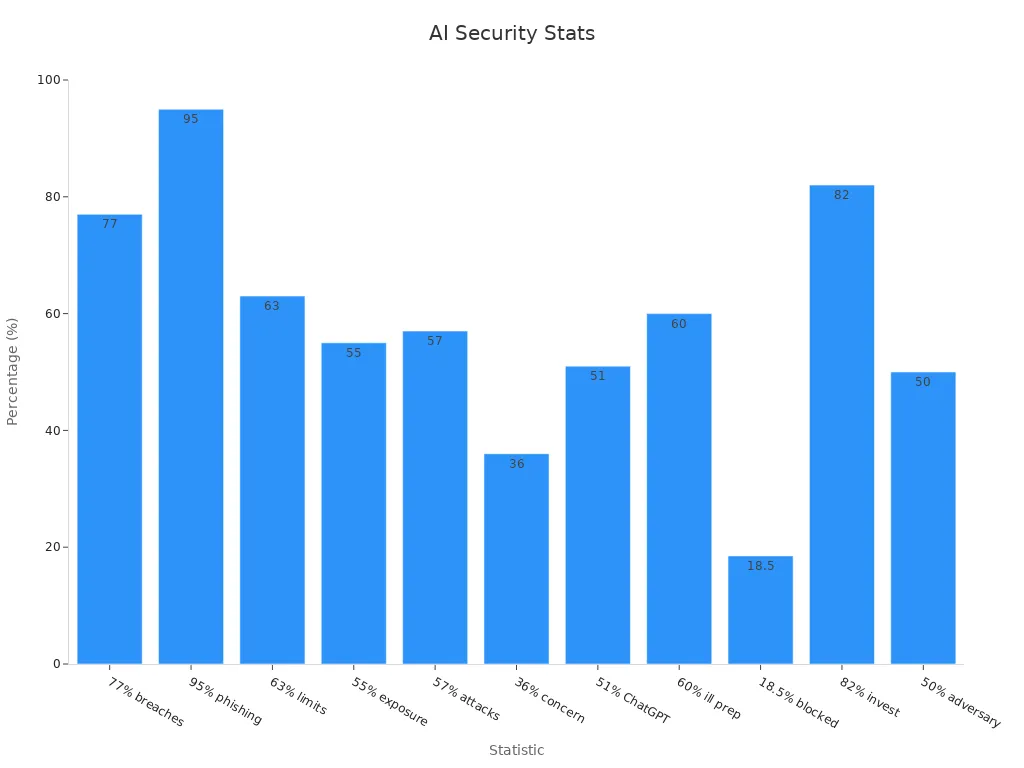
| Statistic | Source |
|---|---|
| 77% of companies experienced breaches in their AI systems over the past year. | HiddenLayer |
| 60% of respondents fear their organizations are inadequately prepared to defend against AI-powered attacks. | Darktrace |
Mitigating Algorithmic Bias in AI Systems
Algorithmic bias poses significant challenges in AI-driven customer interactions. Bias occurs when AI systems make decisions based on incomplete or skewed data. This can lead to unfair outcomes, such as favoring certain demographics over others. For example, Amazon discontinued a recruiting algorithm after discovering it downgraded resumes from women’s colleges due to biased training data.
To mitigate bias, you must prioritize fairness and accountability in AI systems. Clear documentation and regular audits ensure ethical practices. Educating stakeholders about bias and its implications fosters awareness and encourages responsible use of AI. By addressing bias, you can create systems that deliver equitable and unbiased experiences for all customers.
Amazon discontinued the use of a recruiting algorithm after discovering it exhibited gender bias. The algorithm was trained on resumes predominantly from white males, leading to biased outcomes against women, such as downgrading resumes from women’s colleges.
Building and Maintaining Customer Trust in AI Solutions
Trust is essential for successful AI adoption. Customers often worry about how companies use their data and whether AI systems make ethical decisions. Surveys show that 81% of consumers fear data misuse, and 62% don’t trust AI to make ethical choices. Transparency and accountability are key to overcoming these concerns.
Companies like Adobe and Salesforce lead by example. Adobe discloses datasets used to train its AI tools, while Salesforce signals uncertainty in AI predictions to foster confidence. You can build trust by explaining how AI works, safeguarding data privacy, and demonstrating fairness in decision-making. These measures reassure customers and strengthen their confidence in AI solutions.
| Statistic | Percentage |
|---|---|
| Consumers who believe AI poses a significant threat to their privacy | 57% |
| Consumers concerned that companies might misuse their data | 81% |
| Americans who do not trust AI to make ethical decisions | 62% |
| Americans who do not trust AI to make unbiased decisions | 55% |
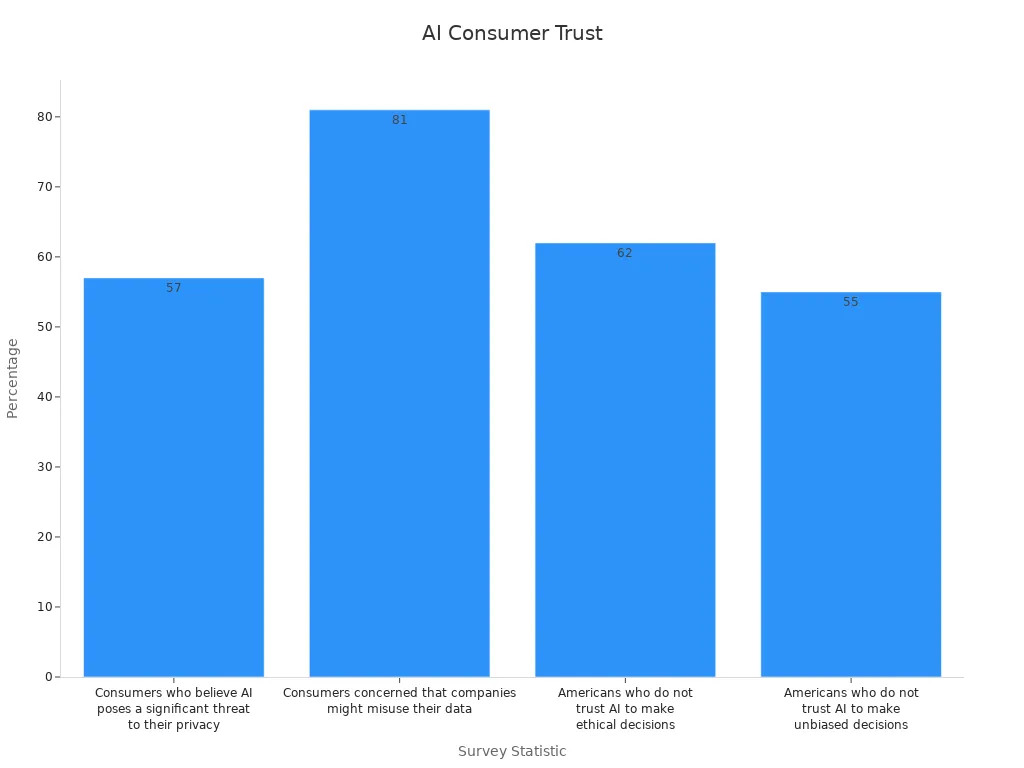
Best Practices for Businesses Adopting AI
Investing in AI Talent and Expertise
Investing in AI talent is essential for businesses aiming to stay competitive. Building a skilled workforce ensures you can effectively implement and manage AI technologies. Companies that prioritize hiring AI specialists and upskilling their teams see measurable benefits. For instance, allocating a portion of your R&D budget to AI innovation can lead to groundbreaking advancements. Metrics like customer lifetime value and churn reduction highlight the financial impact of AI-driven personalization.
| Metric | Description |
|---|---|
| Revenue Attributable to AI Products | Portion of revenue linked to AI-driven offerings, indicating direct financial impact. |
| Churn Reduction and Customer Retention | AI's role in enhancing customer experiences and reducing churn, crucial for subscription models. |
| Customer Lifetime Value (LTV) | Higher LTV achieved through AI-driven personalization, leading to increased profitability. |
| Ratio of AI/ML Specialists to IT Roles | Measures progress in building an AI-oriented workforce, reflecting investment in talent. |
| Training & Upskilling Investments | Amount spent on upskilling employees in AI, indicating commitment to workforce development. |
By focusing on AI talent, you can unlock the full potential of this technology. A well-trained team ensures seamless integration and maximizes the value AI brings to your business.
Ensuring Data Quality and Security
High-quality data is the backbone of effective AI systems. Accurate and reliable data improves AI training, leading to better decision-making and customer interactions. It also reduces errors and accelerates time to market. To achieve this, you must prioritize data validation and cleansing processes.
Robust security measures are equally important. Techniques like encryption and authentication protect sensitive customer information. A secure environment not only ensures compliance with regulations but also builds trust in your AI solutions. Customers feel more confident when they know their data is safe.
- High-quality data enhances AI reliability and effectiveness.
- Robust security measures protect sensitive information and ensure compliance.
- Encryption and authentication boost confidence in AI technologies.
By maintaining data quality and security, you can improve AI performance and foster customer trust.
Balancing Hyper-Personalization with Privacy
Hyper-personalization enhances customer engagement, but it comes with privacy challenges. Striking the right balance is crucial. Customers expect personalized experiences, yet they also demand transparency about how their data is used. The Facebook-Cambridge Analytica incident serves as a reminder of the risks when privacy is overlooked. This event led to stricter regulations and highlighted the importance of ethical data practices.
To address these concerns, you should obtain clear consent before using customer data. Implementing privacy-first AI strategies ensures compliance with evolving regulations. Ethical data usage not only prevents breaches but also strengthens customer relationships. Companies that prioritize privacy while delivering personalized experiences gain a competitive edge.
Tip: Always prioritize transparency and ethical data practices to build trust and loyalty.
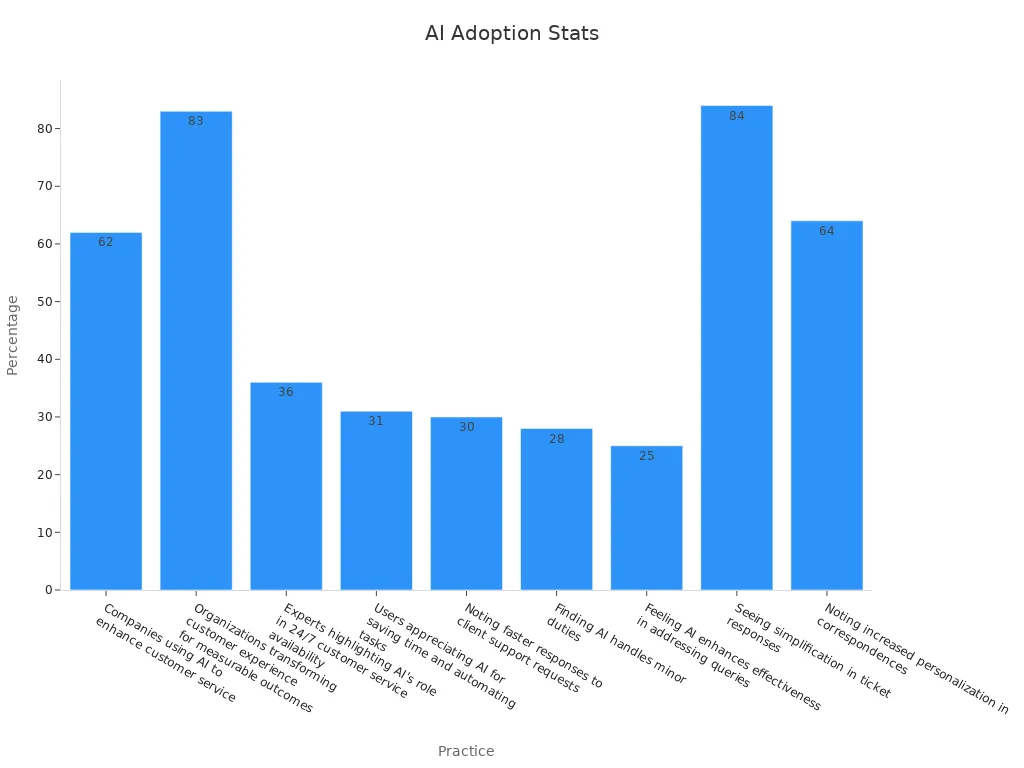
Balancing personalization with privacy requires constant vigilance. By adopting responsible AI practices, you can meet customer expectations while safeguarding their trust.
Leveraging Sobot's AI Solutions for Scalable Customer Support
Scaling customer support effectively requires tools that can handle high volumes of inquiries while maintaining quality. Sobot’s AI solutions excel in this area, offering businesses the ability to automate processes, improve efficiency, and deliver exceptional service across multiple channels.
How Sobot Enhances Scalability

Sobot’s AI Chatbot operates 24/7, resolving routine queries autonomously. It handles over 80% of customer inquiries with accuracy, freeing your agents to focus on complex issues. Its multilingual capabilities ensure seamless communication with a global audience. By integrating Sobot’s chatbot, you can reduce inbound discussion volume by 20% and achieve a customer satisfaction score of over 96%.
The scalability of Sobot’s solutions is evident in its performance metrics:
| Performance Outcome | Metric |
|---|---|
| Reduction in inbound discussion volume | 20% |
| Customer satisfaction score | 96%+ |
| Correct answers provided by AI | Over 80% |
| Customer satisfaction with AI responses | Over 95% |
| Self-service question resolution | 22.2% |
| Customer satisfaction score (CSAT) | 97% |
| Problem resolution rate | 85% |
| Customer happiness rate | 99% |
| Sign-off rate increase | 35% |
| COD collection rate increase | 40% |
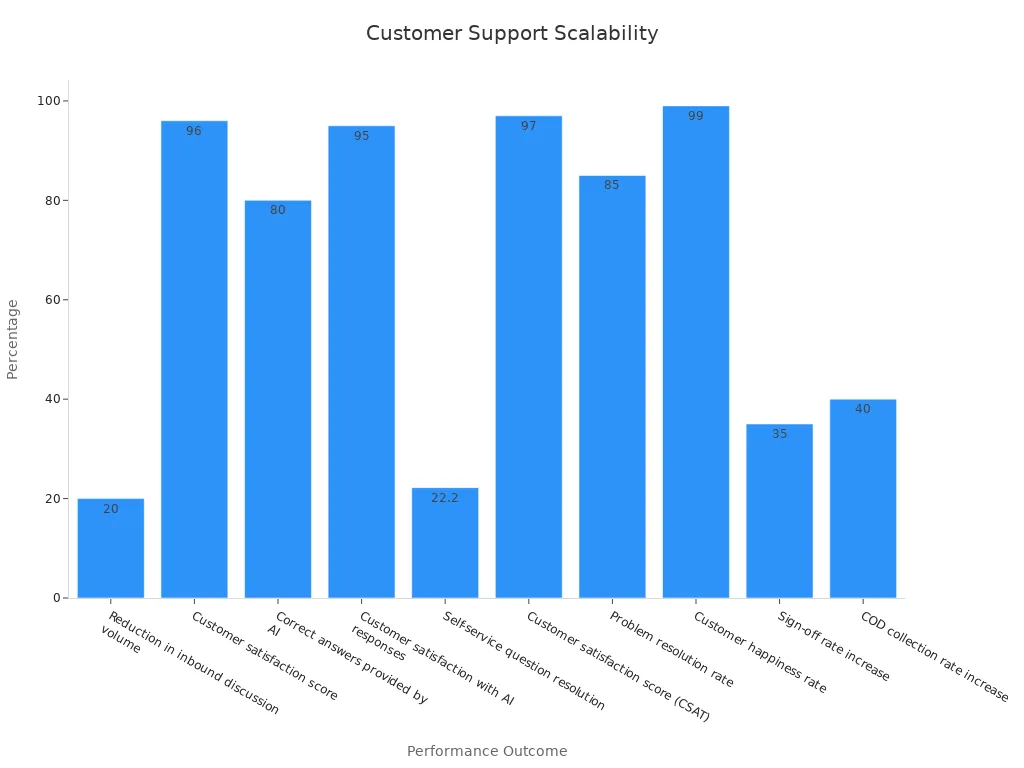
Real-World Impact
Brands like Michael Kors have leveraged Sobot’s solutions to transform their customer support operations. By unifying communication channels and integrating AI tools, they reduced response times by 83% and achieved a 95% customer satisfaction rate. These results highlight how Sobot’s scalable solutions empower businesses to meet growing customer demands without compromising service quality.
Tip: Start using Sobot’s AI-powered tools to scale your customer support while enhancing satisfaction and efficiency. Visit Sobot AI Solutions to learn more.
Sobot’s AI solutions redefine scalability in customer support. By automating processes and delivering personalized experiences, you can achieve operational excellence and build lasting customer relationships.
Future Trends in AI and Customer Experience
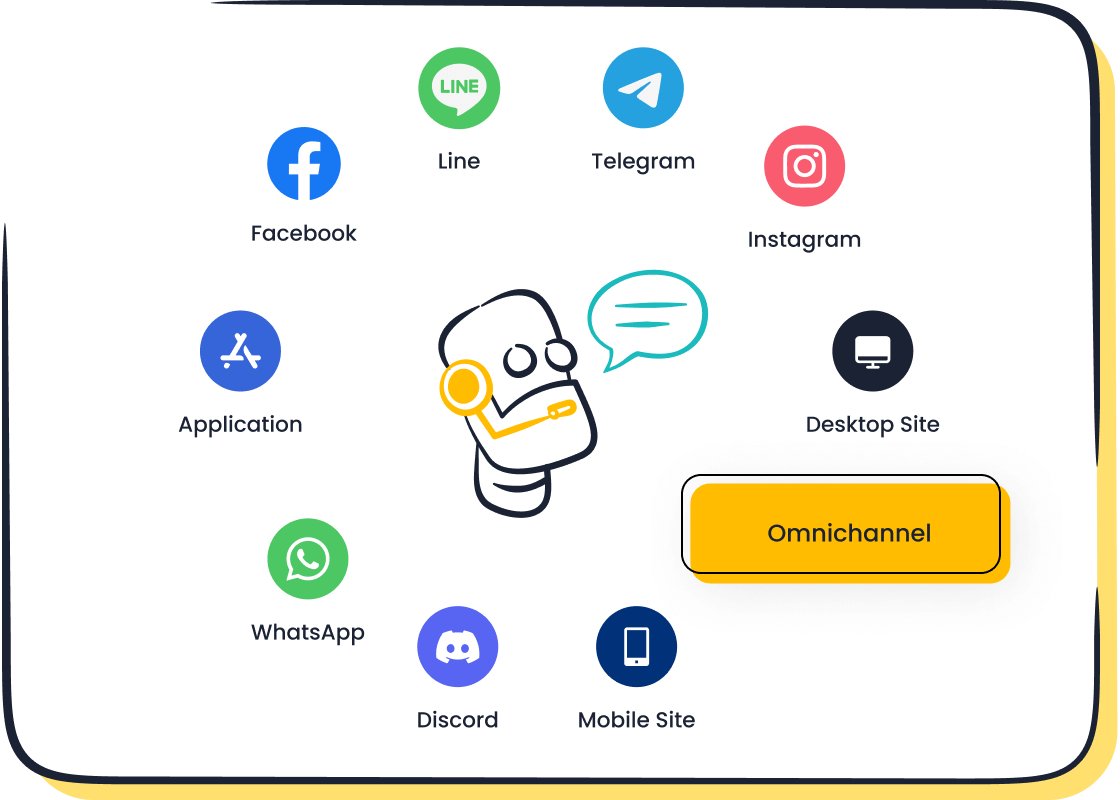
Hyper-Personalization at Scale with AI
AI personalization is evolving rapidly, enabling businesses to deliver tailored experiences to millions of customers simultaneously. Companies like Amazon and Netflix have set benchmarks by using AI to analyze user behavior and provide personalized recommendations. For example, Amazon suggests products based on shopping habits, while Netflix curates content based on viewing preferences. This scalability allows businesses to engage customers more effectively, driving loyalty and revenue growth.
By 2025, hyper-personalization will redefine customer connections. Real-time data will enable businesses to create marketing campaigns that resonate with individual preferences. Spotify’s personalized playlists, such as "Discover Weekly," highlight how AI can enhance engagement by understanding user preferences. Businesses adopting AI-driven hyper-personalization will experience significant transformation in customer experience, improving satisfaction and retention.
“The amalgamation of different data streams helps companies understand customer behavior at a granular level that simply wasn’t possible before.”
Autonomous AI Decision-Making in Customer Support
Autonomous AI is revolutionizing customer support by enabling systems to make decisions without human intervention. This technology streamlines workflows, reduces response times, and enhances service quality. IBM’s research shows that autonomous AI agents are crucial for automating routine tasks, allowing human agents to focus on complex issues. Fujitsu highlights how Agentic AI enhances personalization and customer retention by making real-time decisions during interactions.
For example, AI can predict customer needs based on past interactions, offering proactive solutions. This approach improves satisfaction and builds trust. Businesses using autonomous AI in customer support report higher efficiency and better customer experiences. By adopting this technology, you can stay ahead of customer expectations and deliver exceptional service.
Integration of AI with Emerging Technologies (e.g., AR/VR)
The integration of AI with AR and VR is transforming customer experience by creating immersive and interactive environments. AI enhances user interactions in VR, offering personalized experiences that adapt to individual preferences. For instance, AI-driven immersive training solutions improve productivity by up to 50% in technical roles. These technologies also address limitations in traditional corporate training, such as scalability and consistency.
Manufacturers leveraging AI in AR/VR report significant cost savings and reduced downtime. However, challenges like processing power and potential biases must be addressed to maximize the benefits. As AI continues to evolve, its integration with AR/VR will unlock new possibilities, enhancing customer engagement and operational efficiency.
AI is revolutionizing how you interact with businesses, creating more personalized and efficient customer experiences. It empowers companies to deliver smarter solutions and meet rising expectations. For instance:
By adopting AI tools like Sobot's Chatbot, you can enhance engagement, improve satisfaction, and thrive in the competitive landscape of 2025. AI isn't just a tool; it's the future of customer experience.
FAQ
1. How does AI improve customer service efficiency?
AI automates repetitive tasks, such as answering common questions, allowing human agents to focus on complex issues. Tools like Sobot’s AI Chatbot operate 24/7, handle inquiries across multiple channels, and reduce response times by up to 83%. This improves efficiency and customer satisfaction.
2. Can AI personalize customer interactions in real time?
Yes! AI analyzes live data to tailor responses instantly. Sobot’s AI Chatbot adapts to customer behavior, offering personalized recommendations and proactive support. This creates meaningful interactions that boost engagement and loyalty.
3. Is AI suitable for small businesses?
Absolutely! AI tools like Sobot’s solutions are scalable and easy to deploy. They require no coding and help small businesses automate processes, reduce costs, and deliver exceptional service. AI levels the playing field for businesses of all sizes.
4. How does Sobot ensure data security in AI systems?
Sobot uses encryption, GDPR compliance, and continuous backups to protect sensitive data. These measures ensure your customers’ information remains secure while enabling AI to deliver personalized experiences.
5. What industries benefit most from AI-powered customer experience tools?
Retail, e-commerce, finance, gaming, and enterprise services benefit significantly. AI enhances customer support, streamlines operations, and boosts engagement. Sobot’s solutions cater to diverse industries, helping brands like Michael Kors achieve a 95% customer satisfaction rate.
Tip: Explore Sobot’s AI tools to see how they can transform your customer experience strategy.
See Also
Enhancing Efficiency With AI-Driven Customer Service Solutions
Transforming Support Through AI Customer Service Agents
Increasing Customer Satisfaction With E-commerce Chatbots
